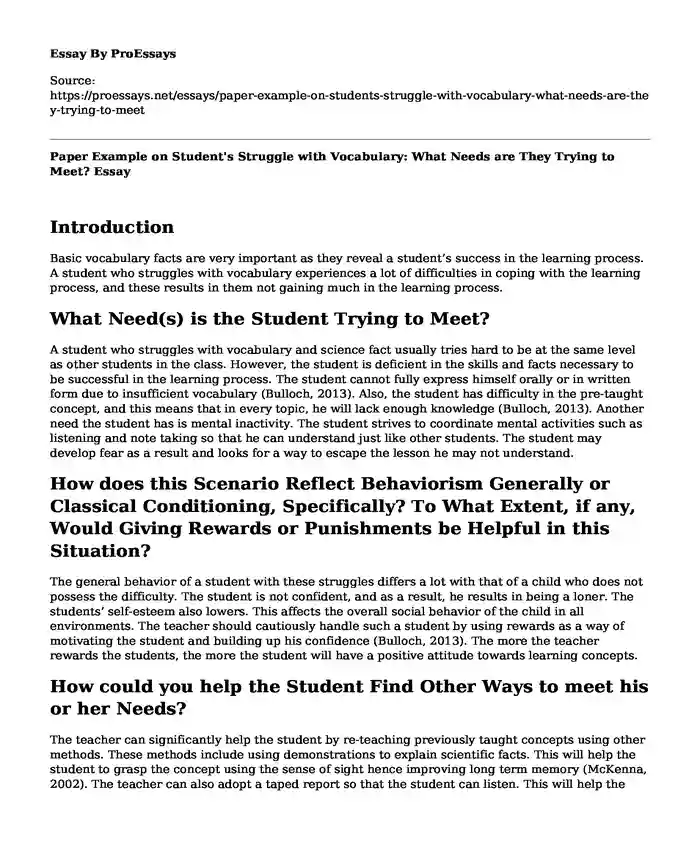Introduction
Basic vocabulary facts are very important as they reveal a student’s success in the learning process. A student who struggles with vocabulary experiences a lot of difficulties in coping with the learning process, and these results in them not gaining much in the learning process.
What Need(s) is the Student Trying to Meet?
A student who struggles with vocabulary and science fact usually tries hard to be at the same level as other students in the class. However, the student is deficient in the skills and facts necessary to be successful in the learning process. The student cannot fully express himself orally or in written form due to insufficient vocabulary (Bulloch, 2013). Also, the student has difficulty in the pre-taught concept, and this means that in every topic, he will lack enough knowledge (Bulloch, 2013). Another need the student has is mental inactivity. The student strives to coordinate mental activities such as listening and note taking so that he can understand just like other students. The student may develop fear as a result and looks for a way to escape the lesson he may not understand.
How does this Scenario Reflect Behaviorism Generally or Classical Conditioning, Specifically? To What Extent, if any, Would Giving Rewards or Punishments be Helpful in this Situation?
The general behavior of a student with these struggles differs a lot with that of a child who does not possess the difficulty. The student is not confident, and as a result, he results in being a loner. The students’ self-esteem also lowers. This affects the overall social behavior of the child in all environments. The teacher should cautiously handle such a student by using rewards as a way of motivating the student and building up his confidence (Bulloch, 2013). The more the teacher rewards the students, the more the student will have a positive attitude towards learning concepts.
How could you help the Student Find Other Ways to meet his or her Needs?
The teacher can significantly help the student by re-teaching previously taught concepts using other methods. These methods include using demonstrations to explain scientific facts. This will help the student to grasp the concept using the sense of sight hence improving long term memory (McKenna, 2002). The teacher can also adopt a taped report so that the student can listen. This will help the student listen to the vocabulary and practice it as present in the tape. The teacher should motivate the student to keenly and repeatedly listen to the tape since repetition creates emphasis.
Moreover, the teacher can use charts, graphs, and bars to present scientific facts. This mode would involve the student more. Photo essays can also help the student build up his vocabulary (McKenna, 2002). The photos help the student to recall. The teacher can further help the student by; encouraging him to ask questions, asking the student questions that require only short answers, encouraging other forms of giving responses apart from orally, giving the student more time for reading, motivate the student by appreciating his efforts, allowing peers to read together and participate in activities that require hand skills such as science projects.
How would you help the Student Retain and Retrieve the Necessary Information?
The teacher should encourage shared note-taking. This will help since important points can be highlighted or bolded without difficulty hence providing a chance for quick referencing. Secondly, the use of acronyms to help visualize lists (Bulloch, 2013). Acronyms simplify the student's work and help in quick recalling. Other ways include: taping the student and giving picture clues for the student to complete sentences and get answers
How could you use what the Student Already Knows to help the Student Learn the Necessary Information?
The teacher should never assume that the student has prior knowledge of the topic to be taught. The teacher, therefore, has a responsibility to first enquire from the student what he knows in relation to the topic (Porsch & Whannell, 2019). The teacher now uses the known information by the learners as a foundation to lay the new set of instructions or information for the current topic. This helps the student to understand as the teacher explains from the student’s point of view hence avoiding misinforming the student. The student also gets interested in learning since he is part of the learning process.
Conclusion
The teacher plays a significant role in identifying a student with vocabulary difficult as well as science facts.it is important that the teacher deals patiently with the student so that the skills can be taught and understood by the student. To cope with such challenges in class, the teacher must create a conducive learning environment for all learners.
References
Bulloch, K. (2013). How to Adapt Your Teaching Strategies to Student Needs.
https://www.dyslexicadvantage.org/wp-content/uploads/2016/09/How-to-Adapt-Teaching-1.pdf
McKenna, M. C. (2002). Help for struggling readers: Strategies for grades 3-8. Guilford Press. https://books.google.com/books?hl=en&lr=&id=AF7qhdDLacgC&oi=fnd&pg=PA1&dq=McKenna,+M.+C.+(2002).+Help+for+struggling+readers:+Strategies+for+grades+3-8.+Guilford+Press.&ots=MgQAWUvC3p&sig=NosSlimsajU5PqE08VBaxDrO4VQ
Porsch, R., & Whannell, R. (2019). out-of-field teaching affecting students and learning: What is known and unknown. In Examining the Phenomenon of “Teaching Out-of-field” (pp. 179-191). Springer, Singapore. https://link.springer.com/chapter/10.1007/978-981-13-3366-8_7" https://link.springer.com/chapter/10.1007/978-981-13-3366-8_7
Cite this page
Paper Example on Student's Struggle with Vocabulary: What Needs are They Trying to Meet?. (2023, Sep 17). Retrieved from https://proessays.net/essays/paper-example-on-students-struggle-with-vocabulary-what-needs-are-they-trying-to-meet
If you are the original author of this essay and no longer wish to have it published on the ProEssays website, please click below to request its removal:
- The Single-Sex High School as a Feature of Secondary Education Has Lost Its Relevance
- The Effects of Divorce on Children Paper Example
- Annotated Bibliography: Student's Truancy
- Reflective Essay on Studying in an International Environment
- David Wallace's Captivating Speech to Kenya College Graduates: Daring and Stirring - Essay Sample
- Essay Example on Online vs Traditional Classes: What's the Difference?
- My Journey to Becoming a Doctor: My Passion and Dedication - Personal Statement Sample







